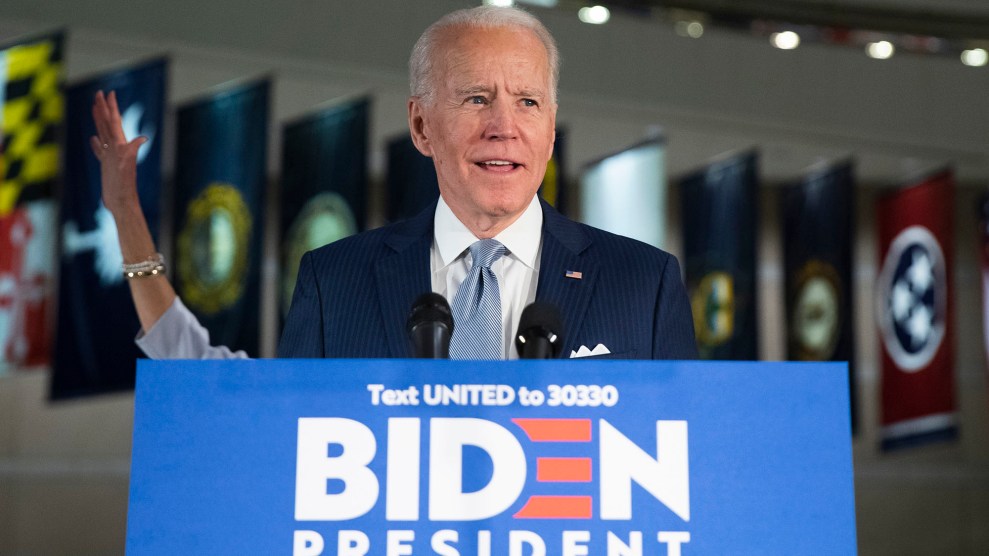
Matt Rourke/AP
On Wednesday night, President Donald Trump addressed the nation from the Oval Office and offered a series of false statements about the global coronavirus pandemic and his administration’s plan to stop it. The United States is “more prepared” than similarly afflicted countries. (No, it isn’t.) He would be blocking virtually all people and “cargo” from Europe. (Actually, cargo could still come, and so could American citizens.) “Testing and testing capabilities are expanding rapidly, day by day.” (Only true for the Utah Jazz, it turns out.)
On Thursday afternoon, his likely Democratic opponent took a far different approach. Speaking from a podium in his hometown of Wilmington, Delaware, former vice president Joe Biden laid out his own plan for combating the crisis: a mix of short- and long-term economic and public health reforms that he argued the nation couldn’t wait until after the election to implement. It was the kind of announcement you might expect from someone who’s already in charge, not someone 10 months away at best. But as the campaign shifts into a new gear amid a global crisis, and Trump and Senate Republicans continue to dither, Biden, like many an eager job seeker before him, is auditioning for the job he wants by just going out there and doing it.
Biden’s “road map,” he explained, wasn’t something he intended to push through if elected. It was “the leadership that I believe is required at this very moment.” A friendly bit of advice, if you will, for Trump and Congress. His plan called for a mix of funding and accountability measures. Tests (and vaccines, when they’re available) should be “free of charge” and made widely available to the communities most in need, such as nursing homes and senior centers, and “drive-through testing” should be available at select locations.
But the problem went deeper than the lack of testing kits, he continued—hospitals need “surge capacity.” He proposed having the Federal Emergency Management Agency work with local governments to ensure they can “establish temporary hospitals” if necessary, and getting the Department of Defense involved in “planning now to prepare for the potential deployment” of “medical facility capacity and logistical support that they can only do.”
“We can do that but we are not ready yet, and the clock is ticking,” Biden said.
The other prong of Biden’s plan was economic. He laid out a list of ideas that would, he believed, serve as both stimulus and safety net—meals for kids who have to miss school, relief for “people who have difficulty paying their rent or mortgage” (something already happening in Italy), interest-free loans for small-business owners. “It’s a national disgrace that millions of our fellow citizens don’t have a single day of paid sick leave available,” he said, and stated that his priority would be gig-economy workers and others on the lower rungs of the economic ladder, not “Google or Goldman.”
This is what the campaign is going to look like for the foreseeable future, as containment measures have effectively canceled the traditional campaign schedule. A few hours before Biden spoke, the Democratic National Committee announced that the next debate had been moved from Phoenix to an audience-free TV studio in Washington, DC. He announced plans for a virtual town hall with Illinois voters, who go to the polls on Tuesday. Biden’s remaining Democratic opponent, Bernie Sanders, was giving his own speech on coronavirus later that afternoon.
Whether Trump is going to listen to Joe Biden on any of this, of course, is an entirely different matter. As Biden alluded to, this was not the first time he’d offered advice on how to approach the coronavirus crisis. In January, when the epidemic was still largely confined to China, he published an op-ed in USA Today warning that Trump’s cavalier approach to the virus, his belligerence toward the international community, and his assault on the civil service had made the nation far more vulnerable. “He dismissed the top White House official in charge of global health security and dismantled the entire team,” Biden wrote. On Wednesday, he promised to bring those experts back into the fold. “For some reason I still don’t understand, President Trump eliminated that office two years ago,” he said.
Since he launched his campaign last year, Biden has presented himself to the public very deliberately as a steady hand in turbulent times. There’s never been a more important moment, he seems to realize, to show voters what that might look like.













